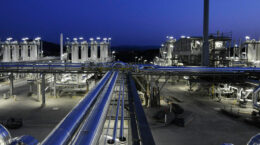BASF and bse Engineering sign development agreement to transform CO2 and excess current into methanol
- New process in small-scale, delocalized production units enables economically viable transformation of excess current and CO2 into chemical energy storage
- BASF will provide bse Engineering with custom made catalysts adapted to this new process
- Partnership will help to introduce a sustainable process for using CO2 and excess current
Ludwigshafen and Leipzig, Germany, August 24, 2017 – BASF and bse Engineering today signed an exclusive joint development agreement for BASF to provide custom made catalysts for a new chemical energy storage process. This process will enable economically viable transformation of excess current and off-gas carbon dioxide (CO2) into the chemical energy storage methanol in small-scale, delocalized production units.
When generating current from renewable energy sources such as in wind or solar power plants, excess current is generated at times when consumers do not need it. This excess current can often not be reasonably used at the moment. The effective usage of this excess current is a decisive factor in making power production from renewable energy sources economically viable.
CO2 is generated in some industrial production plants such as in steel production, incineration plants or coal power plants. The reduction of this greenhouse gas is one of the most important targets set in the context of the 2015 Paris Climate Protection Agreement.”
The new process developed by bse Engineering enables the sustainable use of current and CO2 with small-scale, delocalized production units built where the two components are generated, i.e. near power plants using renewable sources of energy as well as large-scale industrial plants producing CO2. The excess current will be used to produce hydrogen through discontinuous electrolysis. In a second step, methanol is produced from CO2 and hydrogen, thus leading to a valorizing of excess current and CO2 off-stream gas.
In the second process step, BASF’s catalysts will be used for the methanol synthesis step. Those catalysts have been further tuned and adapted for this specific process to enable the most efficient production of methanol. Methanol is one of the most important basic chemicals used in numerous industrial applications. For example, it is blended into diesel or gasoline in some countries.
“We are pleased to participate in this exciting endeavor and to contribute significantly to a concrete solution for the use of excess current and CO2 as a raw material,” said Adrian Steinmetz, Vice President Chemical Catalysts at BASF. “We will leverage our know-how and expertise in catalysis in the service of advancing a sustainable answer for the transition to new energy sources and the material use of CO2.”
“The cooperation between BASF and bse Engineering is another example of our successful approach to collaborating with engineering companies and plant manufacturers. In doing so we contribute our unique know-how as the world leader in the production of catalysts to facilitate new processes and innovative technologies of tomorrow,” said Detlef Ruff, Senior Vice President Process Catalysts at BASF.
“After four years of developing the global process concept, we are now ready to enter the licensing phase of this process, with construction of the first plants starting soon,” said Christian Schweitzer, Managing Director of bse Engineering. “The implementation of these projects is ensured with international branch leaders of the respective process units and part-services over a reliable consortium consisting of Aker Solutions ASA, Sulzer Chemtech AG, InfraServ GmbH & Co. Knapsack KG, led by bse Engineering. We are very proud to work on the key technology catalysts with an experienced and innovative industry leader like BASF to make our vision a reality.”
About bse Engineering
According to the motto "More Solutions - Less Buildings," BSE ENGINEERING LEIPZIG GMBH maximize their customers' benefit through individually aligned organizational, logistical, economical, normative and – not only – construction measures. We go for a long-term partnership as factory planner with our customers. And through the cooperation with freelancers and business partners we are able to adjust our skills and capacities to meet our customers' requirements. http://www.bse-engineering.eu
About BASF’s Catalysts Division
BASF’s Catalysts division is the world’s leading supplier of environmental and process catalysts. The group offers exceptional expertise in the development of technologies that protect the air we breathe, produce the fuels that power our world and ensure efficient production of a wide variety of chemicals, plastics and other products, including advanced battery materials. By leveraging our industry-leading R&D platforms, passion for innovation and deep knowledge of precious and base metals, BASF’s Catalysts division develops unique, proprietary solutions that drive customer success. Further information on BASF’s Catalysts division is available on the Internet at www.catalysts.basf.com.
About BASF
At BASF, we create chemistry for a sustainable future. We combine economic success with environmental protection and social responsibility. The approximately 114,000 employees in the BASF Group work on contributing to the success of our customers in nearly all sectors and almost every country in the world. Our portfolio is organized into five segments: Chemicals, Performance Products, Functional Materials & Solutions, Agricultural Solutions and Oil & Gas. BASF generated sales of about €58 billion in 2016. BASF shares are traded on the stock exchanges in Frankfurt (BAS), London (BFA) and Zurich (BAS). Further information at www.basf.com.


